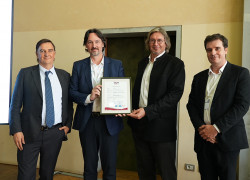PwC Luxembourg releases a comparative study of cross-border RMB centres
With ¥64bn of RMB deposits, Luxembourg is RMB hub for the eurozone
In the foreseeable future, we expect that the Chinese regulator will continuously deregulate the capital account and achieve full convertibility of RMB by 2020. When that happens, the market will play the dominant role in the development of cross-border RMB activities. We will see a diversified cross-border RMB market in which financial centres scattered across the globe are closely connecting each other
Dariush Yazdani, Market Research Institute partner at PwC Luxembourg
PwC Luxembourg has released today a comparative study of cross-border RMB centres, entitled Where do you Renminbi?, during the Renminbi Forum, hosted by Luxembourg for Finance in partnership with Clearstream at Philharmonie.
This report, preceded by a statement of Mr. Pierre Gramegna, Minister of Finance, aims to present the main financial centres which are positioning themselves to assist China in the internationalisation of its currency.
Internationalisation of Renminbi: Financial centres to play a complementary role
While Hong Kong is by far the most developed RMB offshore centre with sufficient liquidity and a broad range of RMB products, other RMB international centres have developed individual areas of expertise. For example, London and Singapore are known mainly for trade and forex, Taiwan and Germany have the advantage on goods trade and Luxembourg is a financial hub, serving as a gateway between China and Europe for investment and asset management.
The diversity and aptitude of these financial centres is the result of the market’s influence in their development. Within this context, cooperation between different RMB cross-border centres becomes increasingly important, not only because of the complementary roles they play, but also because collaboration prevents the fragmentation of offshore RMB markets. For instance, Hong Kong extended the opening hours of the RTGS system to facilitate RMB clearing and settlement for European countries, the stock exchanges in Singapore and Hong Kong cooperate on the secondary listing of RMB bonds and asset managers have begun using their RQFII quotas in Luxembourg UCITS funds.
“In the foreseeable future, we expect that the Chinese regulator will continuously deregulate the capital account and achieve full convertibility of RMB by 2020. When that happens, the market will play the dominant role in the development of cross-border RMB activities. We will see a diversified cross-border RMB market in which financial centres scattered across the globe are closely connecting each other,” states Dariush Yazdani, Market Research Institute partner at PwC Luxembourg.
The realisation of internationalising the RMB is no longer an ambitious aspiration, but a reasonable likelihood and Luxembourg has been at the forefront of this development.
The report, Where do you Renminbi?, is available on PwC Luxembourg’s website.
Communiqués liés
A Europe First: PwC Luxembourg achieves European Data Protec...
PwC Luxembourg is delighted to announce it has achieved the European Data Protec...
PwC Luxembourg welcomes New Head of Human Resources, Delphin...
PwC Luxembourg is delighted to welcome its new Head of Human Resources, Delphine...
Emerging Trends in Real Estate®: Europe 2024
According to the latest Emerging Trends in Real Estate® Europe report from PwC ...
PwC Luxembourg: Best ESG (Environmental, Social and Governan...
The CFI.co judges have conferred on PwC Luxembourg the 2023 award for Best ESG (...
New Managing Partner and the Country Leadership Team for PwC...
It is with great pleasure that PwC Luxembourg announces that François Mousel as...
Use of Data Analytics and Artificial Intelligence in Luxembo...
PwC Luxembourg has just released the results of its survey: “Use of Data Analy...
Il n'y a aucun résultat pour votre recherche







